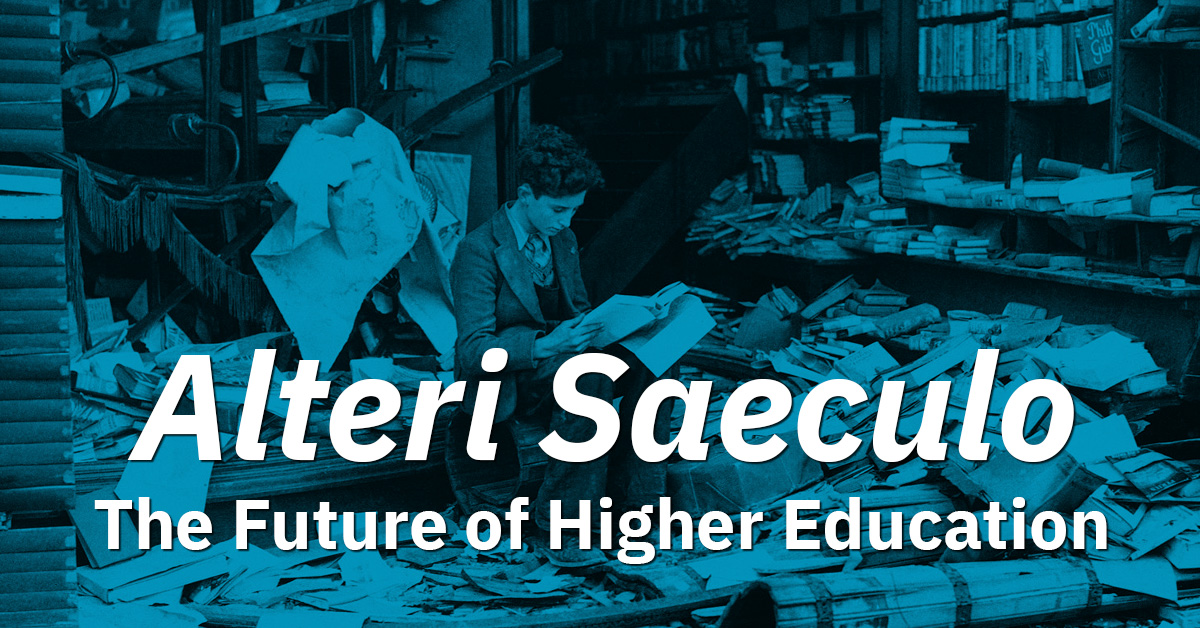An iconographic and text archive related to communication, technology and art.
What is the relationship between communication and education? In his book Democracy and Education: An Introduction to the Philosophy of Education first published in 1916, American philosopher John Dewey shared the following proposition:
Society exists through a process of transmission quite as much as biological life. This transmission occurs by means of communication of habits of doing, thinking and feeling from the older to the younger. Without this communication of ideals, hopes, expectations, standards, opinions, from those members of society who are passing out of the group life to those who are coming into it, social life could not survive. (1957: 3–4)
According to him, “communication” is as a process of education that binds generations together in a shared social project. This understanding perfectly illustrates the Latin motto Alteri Saeculo, which translates to “for other generations” or “for future generations.” The origin of the phrase is rich and complex1. It is a shortened version of the Latin adage Serit arbores, quae alteri saeculo prosint: “Plant trees, so that they may serve another generation” (or alternatively, “another century”: saeculum gives us the French word siècle). Hence, our collective efforts should not be shaped only by the pursuit of immediate results, which can only be done at the expense of future generations.
What Dewey suggests is that we not only communicate together here and now, in the space we all share, professors, students and staff alike. We must also communicate through time, all of us together. In a way, we are what we have inherited from previous generations, but also what we collectively decide to pass on to future generations.
A few lines later, in a section specifically concerned with “Education and Communication,” Dewey again insists:
Society not only continues to exist by transmission, by communication, but it may fairly be said to exist in transmission, in communication. There is more than a verbal tie between the words common, community, and communication. Men live in a community in virtue of the things which they have in common; and communication is the way in which they come to possess things in common. What they must have in common in order to form a community or society are aims, beliefs, aspirations, knowledge—a common understanding—like-mindedness, as the sociologists say. (Ibid. 5)
Dewey’s conception of the function of communication is certainly not the only one around. Nor is it completely impervious to critical scrutiny. For example, when Dewey suggests elsewhere that “Of all affairs, communication is the most wonderful,” his view can appear, from today’s standpoint, overly optimistic.
His views nonetheless help us to understand the relevance of education issues for communication studies. The American documentary Starving the Beast, directed by Steve Mims, offers a timely opportunity to think about the many problems public higher education is currently facing, specifically in the United States:
Starving the Beast examines the ongoing power struggle on college campuses across the U.S. as political and market-oriented forces push to disrupt and reform America’s public universities. The film documents a philosophical shift that seeks to reframe public higher education as a “value proposition” borne by the beneficiary of a college degree rather than as a “public good” for society. Financial winners and losers emerge in a struggle poised to profoundly change public higher education.
More information can be found on the film’s official website, including a press kit and a collection of articles and reviews. More importantly, the site offers a trove of Supporting and Supplemental Documents. The title of the film comes from an expression that has been the subject of many discussions in the United States over the past decades. An interesting history of its origin and meaning can be found in the essay, “Starve the Beast: Origins and Development of a Budgetary Metaphor” published by Bruce Bartlett in the Summer 2007 issue of The Independent Review.
This film raises a series of important questions. How does the situation in Canada compare with the one in the United States? What role does “communication” have in such a context? How should it be taught, and how should it be put into play? As a process, “communication” certainly is not incompatible with market-oriented reforms in higher education. However, as Dewey crucially reminds us, it is not the only goal the university can and needs to serve. At the very least, the idea conveyed by the Latin motto Alteri Saeculo reminds us education should not be subordinated to the pursuit of immediate return on investment2.
• • •
1. The Latin motto is quoted in the work of by Cicero and Johann Gottfried Herder (see below), although its inception can be traced back to Caecilius Statius. For more, see Eugene S. McCartney’s “Arbores Quae Alteri Saeculo Prosint” (The Classical Journal, Vol. 41, No. 2, Nov., 1945, pp. 75-78) and Johann Gottfried Herder: Selected Early Works, 1764-1767 edited Ernest A. Menze, Karl Menges (specifically p. 260, note 128; available via Internet Archive). The note from the latter is reproduced in full below:
128. “the man described elsewhere”: Allusion to Publius Papinius Statius, who is said to have made the remark: “quae serit arbores, ut alteri seculo prosint”: “plant the trees, so that they may serve another century.” Quoted freely in the Literaturbriefe (by Lessing et al.), after Cicero, who, in turn quotes Statius in Cato Maior, De senectute, 7:24, “Serit arbores. quae alteri saeculo prosint.” See comment 101 to Part II.
In Cicero De Senectute, 7:24, we read the following:
But come now—to pass over these divine pursuits—I can point out to you Roman farmers in the Sabine country, friends and neighbours of mine, who are scarcely ever absent from the field while the more important operations of husbandry, as sowing, reaping, and storing the crops, are going on. Although this interest of theirs is less remarkable in the case of annual crops,—for no one is so old as to think that he cannot live one more year—yet these same men labour at things which they know will not profit them in the least.
He plants the trees to serve another age,
as our Caecilius Statius says in his Young Comrades. And if you ask a farmer, however old, for whom he is planting, he will unhesitatingly reply, “For the immortal gods, who have willed not only that I should receive these blessings from my ancestors, but also that I should hand them on to posterity.” (Cambridge: Harvard University Press, Loeb Classical Library Vol. 154, trans. William Armistead Falconer, 1923, pp. 32-33; available via Internet Archive)
In a very short but instructive note, Howard Jacobson suggests the idea behind the motto is actually “a fairly widespread folktale” (see “Trees in Caecilius Statius.” Mnemosyne 30, no. 3 (1977): 291–291). The note is reproduced in full below:
The eminent Roman comic poet of the second century B.C., Caecilius Statius, adapted a comedy of Menander’s, the Synepheboi. In this play there was evidently a scene in which an old farmer was seen planting trees and upon questioning responded that he was planting for the coming generation, just as his forefathers had planted for him: serit arbores quae alteri saeculo prosint. . . . [sero] dis immortalibus qui me non accipere modo haec a maioribus voluerunt sed etiam posteris prodere (Cic. Sen. 7, 24). It seems not to have been noted, either by classicists or by folklorists, that we have here a fairly widespread folktale. Stith Thompson (Motif-Index, J 701.1) has noticed examples from e.g., Rabbinic and Arabic literature. Thus, for instance, the Midrash tells much the same story of the emperor Hadrian and an old farmer planting fig trees (Tanhuma, Kedoshim 8). But this example is, as far as I know, the earliest recorded instance of the motif, particularly so if we assume that the episode was also in Menander’s play1).
1 If, however, Cicero’s words after prosint are his own elaboration and not a paraphrase of Caecilius, then we should have to draw down this instance of the folktale to the first century B.C. ↩︎︎
2. [UPDATE – 2023.12.23] In 2023, a Dean from a major university in North America can write in all seriousness the following line in an email: “As part of a university-wide effort surrounding strategic enrollment planning and improving return on investment (ROI), we are undertaking a systemic review to identify low-enrollment programs in our Faculty and consult departmental colleagues on sustainability of and methods to boost enrollment for these programs.” ↩︎︎
• • •

- By Philippe Theophanidis
- on
- ― Published in Communication
- Tagged: Dewey, education, future

